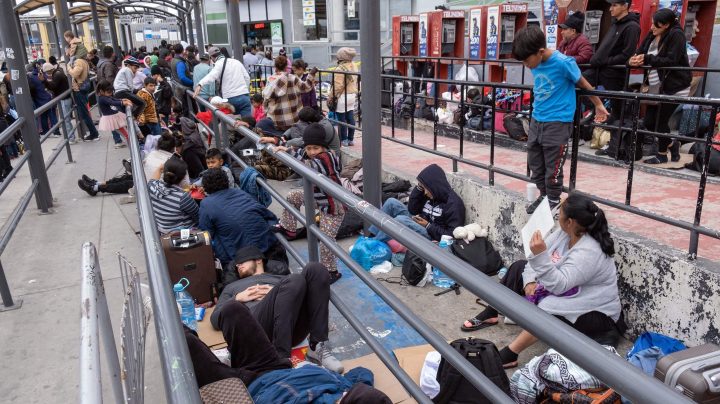
The economic cost of waiting at the border in limbo
The economic cost of waiting at the border in limbo

With pandemic-era emergency health rules now lifted, the Biden administration has introduced new measures that limit migrants’ access to humanitarian protection and deter illegal crossings at the southern border. June saw a significant drop in illegal crossings, fewer than 100,000, the lowest since February of 2021. But what impact are these new rules having on the other side of the border, especially for those applying for asylum and trying to come to the U.S. legally?
Isabel Gil-Everaert is a researcher who’s spent time looking into the changing immigration policies as the U.S. has transitioned from Trump-era “Remain in Mexico” to Biden’s post-Title 42 regulations. She recently co-authored a paper on migration policy in the Journal on Migration and Human Security. Gil-Everaert spoke with “Marketplace Morning Report” host David Brancaccio for more on this. The following is an edited transcript of their conversation.
David Brancaccio: Let’s talk about what some might describe with the word “being in limbo.” You see. x U.S. and Mexican policies as contributing to a prolonged state of people being displaced and not quite sure of their future?
Isabel Gil-Everaert: Yes. So my colleagues Claudia Masferrer, Oscar Rodriguez and I have been working on this subject for a while now. And there’s a term, I guess, coined by the UNHCR, around 2004, that’s called protracted displacement. And we found that concept to be extremely useful to understand what’s going on in the border between Mexico and the U.S. And it refers to precisely what you were saying, this state of limbo where you are not able to plan your next day, you don’t know what’s going to happen with your life or the life of your family members, in the following weeks or months. You can’t decide to enroll in school, you can’t get a job, it’s hard to get a house. So all your life is sort of, like, very unstable, because you’re not able to know what’s going to happen.
Brancaccio: And this can have, obviously, emotional costs, it can have economic costs, it can have costs in terms of forfeited education. I mean, just across the board.
Gil-Everaert: Yes, definitely. And that means that people are living in the shelters, they don’t have a permanent address where they can get mail, they can’t have a bank account, so some of them can’t even get a job. They have no legal documentation, in many instances. So people are just waiting and waiting without being able to get on with their lives.
Brancaccio: What’s your sense, as a researcher who studied this, is this uncertainty built into the policy to discourage people from trying? Or is it just bureaucracy that compounds on itself with government inefficiency?
Gil-Everaert: I mean, I think it’s fair to say that it’s a mix of both. The asylum system and Mexico gets like 100th of the budget of the migration enforcement authorities — they don’t have enough resources to process the amount of asylum requests. And I think something similar may be happening in the U.S. But it’s also hard not to think that there’s sort of a deterrence objective motivating these policies. Like, if you are told you have to wait for a week, even if it’s in hard conditions, but you’re guaranteed that in a week, you get an answer, then you wait. But if they tell you it’s a week, and then it’s a month, and then it’s a year, and then it might be forever, some people might actually be discouraged and just drop their cases because they can’t survive. Maybe that will be a deterrent for them and for others coming behind them.
There’s a lot happening in the world. Through it all, Marketplace is here for you.
You rely on Marketplace to break down the world’s events and tell you how it affects you in a fact-based, approachable way. We rely on your financial support to keep making that possible.
Your donation today powers the independent journalism that you rely on. For just $5/month, you can help sustain Marketplace so we can keep reporting on the things that matter to you.












